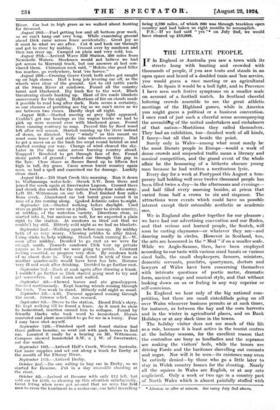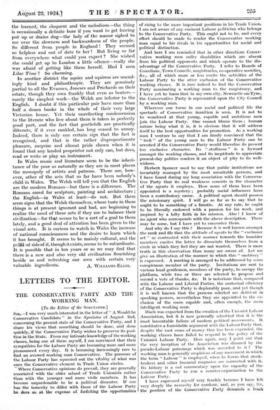THE LITERATE PEOPLE.
IF in England or Australia you saw a town with its streets hung with bunting and crowded with . thousands of people, if you saw tents and stands in an open space and heard of a doubled train and 'bus service, you would guess a race meeting or an agricultural show. In Spain it would be a bull fight, and in Provence I have- seen such festive symptoms on a. smaller scale on account of a football match. In Scotland cheerful loitering crowds assemble to see the great athletic meetings of the Highland games, while in America you might guess a political or a business convention. I once read of just such a cheerful scene accompanying the assemblitg of the united undertakers and embalmers of that nation—Mortitions they called themselves. They had an exhibition, too—finished work of all: kinds, I fancy—but all that is beside the point.
Surely only in Wales—among what must surely, be the most literate people in Europe—would a week of dense crowds and suspended traffic mean a literary and musical competition, and the grand event of the whole affair be the honouring of a hitherto obscure young man because he had written a meritorious lyric.
Every day for a week at Pontypool this August a tem- porary hall -holding well over twelve thousand people has been filled twice a day—in the afternoons-and evenings— and half filled every morning besides, at prices that varied from half a crown to six and sixpence. The attractions were events which could have no possible interest except their ostensible aesthetic or acackinic one.
We in England also gather together for our pleasure ; we have had our advertising convention and our Rodeo, and that serious and learned people, the Scotch, will soon be casting claymores—or whatever they are—and dancing madly in circles.. However in Scotland, too, the arts are honoured in the " Mod " if on a smaller scale. While we Anglo-Saxons, then, have been employed according to our taste with various sized beasts or various sized balls, the small shopkeepers, farmers, ministers, domestic servants, poachers, quarrymen, doctors and lawyers of Wciles have been concerning themselves with intricate questions of poetic metre, dramatic form, ancient usage and musical style, and that without looking down on us or feeling in any way superior or self-conscious.
In England we hear only of the big national com- petition, but there are small eisteddfods going on all over Wales whenever business permits or at such times, for instance, as between the hay and the corn harvests and in the winter in agricultural places, and on Bank Holidays or at any slack time in the towns.
The holiday visitor does not see much of this life as a rule, because it is least active in the tourist centres at the holiday seasons, for the excellent reason that the contraltos are busy as landladies and the sopranos are making the visitors' beds, while the tenors are driving Fords and the baritones shovelling out currants and sugar. Nor will it be seen—its existence may even be entirely denied—by those who go a little later to stay in Welsh country houses for the shooting. Nearly all the squires in Wales are English, or at any rate anglicized. Only a week or two ago in a country part of North Wales which is almost painfully stuffed with the learned, the eloquent and the melodious—the, thing is occasionally a definite bore if you want to get fencing put up or drains dug—the lady , of the manor sighed to me over the slowness and backwardness of the people. So different from people in England ! They seemed so helpless and out of date to her ! But living so far from everywhere what could you expect ? She wished she could get up to London a little oftener—really she was afraid of getting like them herself. Had I seen Lilac Time? So charming.
In- another district the squire and squiress are unend- ingly kind and philanthropic. They are genuinely partial to all the Evanses, Joneses and Prichards on their estate, though they own frankly that even as beaters— surely the simplest work—the Welsh are inferior to the English. I doubt if this particular pair have more than half a dozen books in the whole of their very large Victorian house. Yet their unreflecting condescension to' the literate who live about them is taken in perfectly good part, and the fact that gentlefolk are practically illiterate, if it ever rankled, has long ceased to annoy. Indeed, there is only one certain sign that the fact is recognized, and that is the rather disproportionate pleasure, surprise and almost pride shown when it is found that any landed proprietor not only can, but does, read or write or play an instrument.
In Wales music and literature seem to be the inheri- tance of the poor as naturally as they are in most places the monopoly of artists and patrons. There are, how- ever, other of the arts that so far have been nobody's child in Wales. The Welsh will tell you that the English are the modern Romans—but there is a difference. The Romans cared for sculpture, painting and architecture ; the English—in Wales at least—do not. But there seem signs that the Welsh themselves, whose taste in these things is at present ignorant and bad, are beginning to realize the need of these arts if they are to balance their civilization—for that seems to be a sort of a goal to them lately, and a good deal of attention has been given to the visual arts. It, is curious to watch in Wales the increase of national consciousness and the desire to learn which it has brought. It seems to be mainly cultural, and the pelitiml side of it, though it exists, seems to be subordinate. It is possible that in ten years or so we may find that there is a new and also very old civilization flourishing besiffe us and refreshing our own with certain very



































 Previous page
Previous page